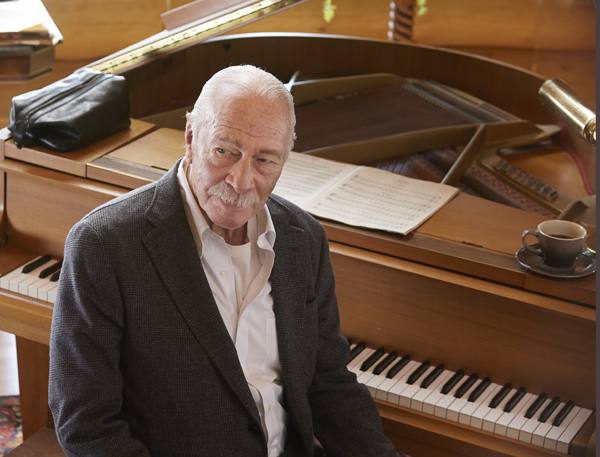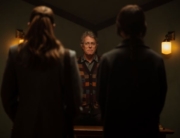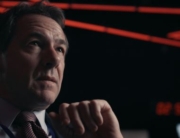Director Atom Egoyan rarely works with an outside screenwriter. In his latest film, a masterly acted and suspenseful vengeance flick, Benjamin August’s assured, multilayered debut script triggers the kind of immense grief that has suffused Egoyan’s work, particularly in how lives are impacted by larger tragedies, and many have been based on or inspired by real events. Seventy years since the Nuremberg trials of some men who were in charge of the Holocaust, and 15 years since the Simon Wiesenthal Center launched “Operation: Last Chance” to push for the prosecution of hands-on Nazi perpetrators, countries have been playing belated catch-up to find and try those whom the Rwandans pointedly term “genocidaires” before they die in peace from old age.
When 90-year-old Zev Guttman (Christopher Plummer) springs out of bed in his old-age home, he’s at peace, but he has forgotten his family has just finished sitting shiva after the funeral of his wife, Ruth. Down the hall, his wheezing, wheelchair-bound, oxygen-toting friend, Max Rosenbaum (Martin Landau, who played Wiesenthal in a TV movie), remembers everything: how both men bear Auschwitz tattoos and witnessed the murders of families at the hands of a cruel SS commandant, Rudy Kurlander. Max reminds Zev that they had been whiling their time planning revenge since learning that the Nazi assumed a new identity after the war to flee to the United States.
Max leaves Zev a package with detailed instructions that rekindles Zev’s hatred and determination and will guide him when his mind becomes confused. Max’s letter specifies that he has narrowed down the search for Kurlander to four men of the right age and immigration history. He includes information on where to find each suspect and includes arrangements for taxis, hotel reservations, train and bus tickets, and cash, a cell phone, and more, all neatly and somewhat diabolically laid out. Zev also needs to buy a gun—and the Canadian filmmakers can’t help but put in a dig about how easy it can be to buy, transport, and carry a gun past any possible roadblock during Zev’s quest throughout America.
Through his instructions, Max directs Zev from New York and through the country, and even in Canada, past the heartland of malls to the desolation of rural (right-wing) Idaho and a Bavarian villa in Nevada. Idyllically filmed by Egoyan’s regular cinematographer, Paul Sarossy, this is also a poignant road movie through the immigrant experiences of World War II refugees. Zev’s confrontations with each grandfatherly “Rudy Kurlander” are especially freighted because they are played by renowned German actors known to American audiences for their nuanced portrayal of Nazis: Bruno Ganz as Hitler in Oliver Hirschbiegel’s Downfall (2004), Jürgen Prochnow as the submarine captain in Wolfgang Petersen’s Das Boot (1981), and Heinz Lieven in Paolo Sorrentino’s 2011 similar odyssey in This Must Be the Place. None of these actors, or Plummer, are in their nineties, but their make-up is convincingly age-appropriate.
Each stop reveals different impacts of the past. Of all Zev’s meetings with the younger generations, his most extended, and shocking, takes place outside Boise with a grieving son, John (Dean Norris), who, like Zev, has just buried a family member, his father Rudy. Over a day and night that is like a charged short film in itself, Zev’s fatigued consciousness (and conscience) is triggered by the Nazi memorabilia collected by John’s father and the proud son’s fond retelling of his father’s war anecdotes. Whether Zev’s mental condition will get him to his goal becomes a race against the ravages of time. Or, will his frantic son, Charles (Henry Czerny), track him down first after the he discovers Zev has fled the rest home.
Plummer is brilliant at conveying Zev’s constantly changing states of mind. He switches from the avuncular husband expecting to see his wife again any minute, then snaps into the avenging angel when a fleeting self-awareness hits him. Zev accidentally, and on purpose, plays the card of an amiable, smiling old man whose befuddlement is sometimes feigned, sometimes genuine and that frequently draws children and kind strangers to him.
This thriller opened in the States just before Shabbat Zachor, when a special Torah reading begins with “Zachor” (“Remember”), whether that refers to Amalek in the Bible, who has become the villainous symbol of all those who would harm Jews, or to Hitler. With surprising twists that make this movie more than a Munich-style of revenge, Remember projects a complex, violent interpretation of Martin Luther King Jr.’s warning: “The arc of the moral universe is long, but it bends towards justice.”







Leave A Comment